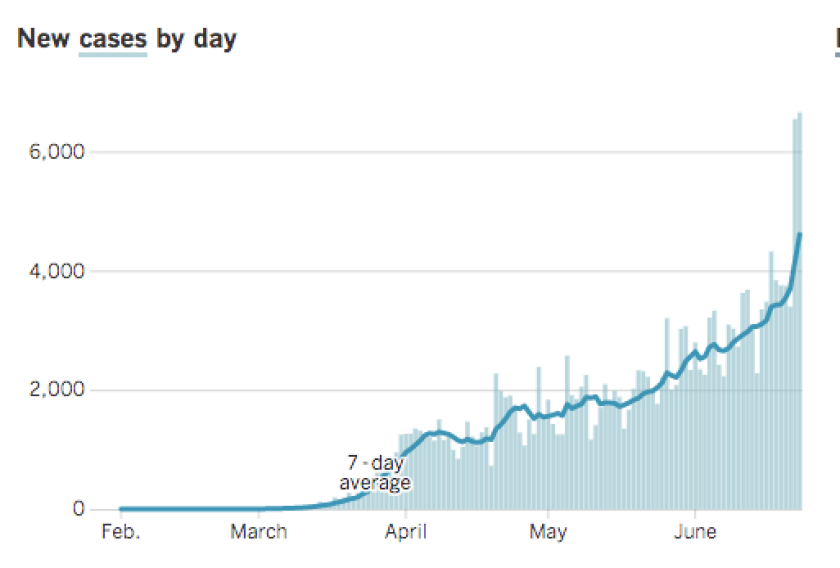Coronavirus cases in California continued a troubling spike this week, but it remains unclear how much worse conditions must get before officials move to slow the rapid reopening of the economy.
For the second consecutive day, California shattered a daily record for new cases Tuesday. More than 6,600 infections were reported — the largest single-day count in the state since the pandemic hit the U.S.



California recorded a second-consecutive day of new daily coronavirus cases, recording 6,652 new cases statewide Tuesday.
(Los Angeles Times)
Hospitalizations from COVID-19 are also beginning to rise in some parts of the state, another troubling sign. Officials in Silicon Valley warned that progress against the coronavirus was eroding. Santa Clara County on Tuesday recorded its largest daily total of new cases — 121 — much worse than any single day in March or April.
“Now, we’re going back up at a pattern similar to the rest of the state,” said Santa Clara County Executive Dr. Jeffrey Smith. “We’re at our highest peak at this point.”
Dr. Sara Cody, the health officer for Santa Clara County, said the increase in cases was worrisome.
“This increase may be accelerating,” Cody said. “This increase reflects both widespread testing — we’re finding more of the cases that do exist — but it also reflects an increase in cases because the virus continues to spread. It’s a bit early to tell if this will translate to a significant increase in hospitalizations and deaths going forward.”
In Ventura County, there was an average of 85 people hospitalized daily with confirmed or suspected coronavirus infections last week, a 67% increase from six weeks ago.
“We’re showing the first signs of starting to lose this battle against COVID-19 in our county,” Dr. Robert Levin, the Ventura County health officer, told the Board of Supervisors. There are increased cases statewide as well. “It worries me. And it should worry you,” he said.
The latest projections from the University of Washington’s Institute for Health Metrics and Evaluation say California may see more than 15,100 deaths by Oct. 1, a 170% increase from the current death toll, which was more than 5,600 as of Tuesday afternoon.
In Los Angeles County, officials Tuesday reported more than 2,000 new cases for the fourth time in the last week, bringing the infection total to more than 88,500. Officials also reported 34 additional deaths, increasing the toll to 3,171 — the bulk of the state’s total.
In San Diego County, officials reported more than 300 new cases on Monday for the second day in a row after breaking a record with more than 310 cases Sunday. An additional 198 cases were reported Tuesday.
The case count is only one metric in tracking the spread of the virus. Although increased testing capacity may account for part of the increase, officials have said the surge cannot be pegged to greater testing alone.
Officials have repeatedly warned that they expect transmission rates to increase as more businesses reopen and people resume normal activities after months-long stay-at-home orders.
L.A. County Public Health Director Barbara Ferrer has said that although it is impossible to track the origin of spread in a public setting, it is “highly likely” that the overall increase is related to mass protests that erupted over the death of George Floyd, as well as clusters of social gatherings at restaurants and private parties.
Across the state, the positivity rate among those tested for coronavirus over the previous 14 days increased from 4.5% to 4.8% in the last week, and the number of hospitalizations of patients with confirmed infections jumped by 16% over the past two weeks.
In L.A. County, the daily positivity rate over a seven-day average jumped to 8.8%. Officials reported Tuesday there were 1,515 people hospitalized with confirmed coronavirus infections, 27% of them in intensive care. Although that number is a far cry from the highs of 1,900 patients in April, it is higher than the daily hospitalization counts of 1,350 to 1,450 in the past few weeks.
Despite the uptick in cases, more cities and counties are continuing to expand their reopening plans.
In San Francisco, Mayor London Breed and Health Director Dr. Grant Colfax announced this week that the city would move up its next phase of reopening from mid-July to June 29. Hair and nail salons, barbershops, museums, zoos, tattoo parlors, massage establishments and outdoor bars will be able to reopen, provided they follow safety protocols.
“Thanks to San Franciscans’ efforts to follow health requirements, wear face coverings and practice social distancing, our COVID-19 health indicators are in a good place, and we can continue reopening our city,” Breed said. “We know a lot of businesses and residents are struggling financially, and this next step will help get more San Franciscans back to work while still balancing safety.”
Gov. Gavin Newsom said state health officials were keeping a close eye on the numbers. He added that he felt confident the state would be able to respond to the virus in the weeks and months ahead.
“We’ve always walked into this with our eyes wide open. We’ve always prepared for a surge,” he said. “I feel like we anticipated the likelihood as we’ve reopened, of the numbers increasing, and they have.”
Times staff writers Sean Greene and Iris Lee contributed to this report.

